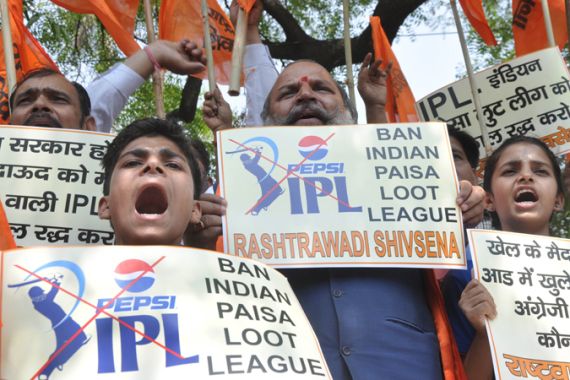Sreesanth banned for life for spot-fixing
Test bowler and other Rajasthan Royals players found guilty of spot-fixing during the Indian Premier League.

Rajasthan Royals players Shantakumaran Sreesanth and Ankeet Chavan have been banned for life by the Board of Control for Cricket in India for being involved in spot-fixing in this year’s Indian Premier League.
Former player Amit Singh, a bookie, was banned for five years on Friday, and Royals pace bowler Siddharth Trivedi was banned for one year for failing to report an approach by bookies.
Keep reading
list of 4 itemsAustralia’s Smith joins Washington Freedom before MLC cricket season
Jadeja reaches IPL cricket milestone in Chennai’s win over Kolkata
Sri Lanka beat Bangladesh by 192 runs to sweep Test series 2-0
Harmeet Singh was let off due to lack of evidence after it was reported that he too had been approached by illegal bookies.
No decision was made on Royals spinner Ajit Chandila, who was arrested with Sreesanth and Chavan in May. Unlike the latter two, Chandila had been mainly in police custody since then until he was granted bail on Monday, and had not been available to talk to anti-corruption officer Ravi Sawani, who led the BCCI investigation.
Investigation
The BCCI made the decisions “after considering the evidence on record and hearing each of the players in person,” it said in a statement.
The players were still subject to an investigation by Indian police. Sreesanth, who played 27 Tests and 53 one-dayers for India to 2011, Chandila and Chavan, alleged to be the main accused, were said to be part of an elaborate plan in which bowlers gave away more than a specified number of runs per over in return for money from illegal bookies.
Their arrest led to the questioning of two prominent IPL officials.
Chennai Super Kings team principal Gurunath Meiyappan, son-in-law of BCCI president Narainswamy Srinivasan, spent two weeks in jail for being in touch with illegal bookies before receiving bail, while Royals co-owner Raj Kundra conceded to betting on matches but was not arrested.
Meiyappan and Kundra were cleared of their charges by a two-member BCCI judicial panel which was subsequently declared “illegal and unconstitutional” for not being formed in line with the BCCI’s own rules by the Bombay High Court. The BCCI has contested the order and the case is before the Supreme Court.
Several bookies and some other former domestic-level players were also alleged to be part of the spot-fixing racket which came to light within a year of a similar controversy of lesser proportions.
Last year, little-known all-rounder TP Sudhindra was handed a life ban after he was filmed in a sting operation by India TV, agreeing to bowl a no-ball at a predetermined time in a local Twenty20 game in the central Indian city of Indore.
Another uncapped player, Shalabh Srivastava, was given a five-year ban for agreeing to spot-fixing in the IPL even though he did not go on to do so.
Three others – Mohnish Mishra, Amit Yadav and Abhinav Bali – receive done-year bans for “loose talk and unsubstantiated bragging” after they were shown on TV claiming to negotiate their IPL contracts illegally.